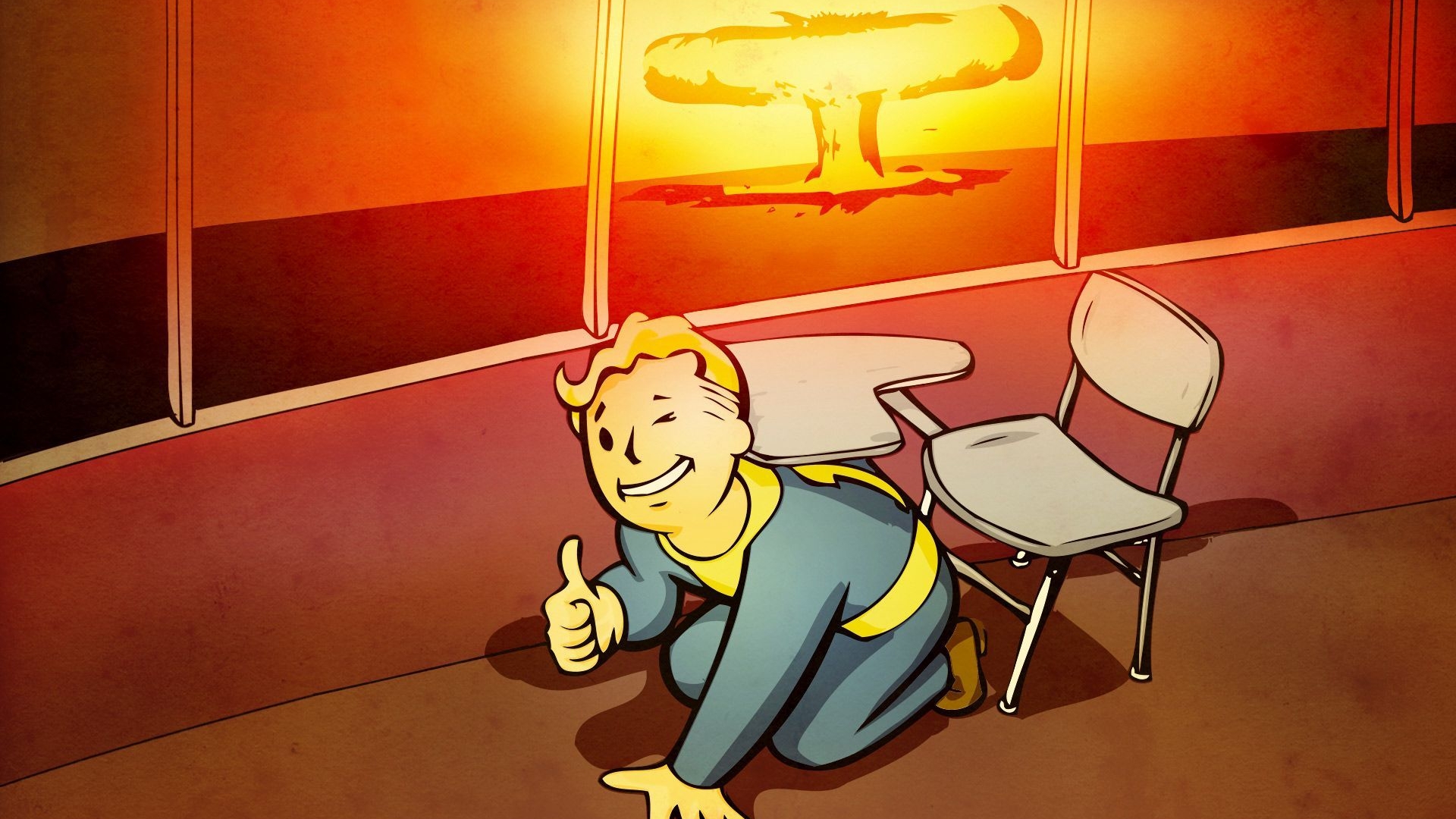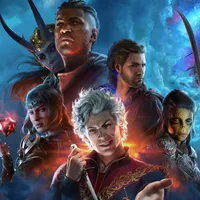The original Fallout's lead developer says China nuked first, vault suits were meant to be 'extruded' by a machine, and yes Sugar Bombs are a Calvin and Hobbes reference
Also points out you're far from the first to leave your vault.

Keep up to date with the most important stories and the best deals, as picked by the PC Gamer team.
You are now subscribed
Your newsletter sign-up was successful
Want to add more newsletters?

Every Friday
GamesRadar+
Your weekly update on everything you could ever want to know about the games you already love, games we know you're going to love in the near future, and tales from the communities that surround them.

Every Thursday
GTA 6 O'clock
Our special GTA 6 newsletter, with breaking news, insider info, and rumor analysis from the award-winning GTA 6 O'clock experts.

Every Friday
Knowledge
From the creators of Edge: A weekly videogame industry newsletter with analysis from expert writers, guidance from professionals, and insight into what's on the horizon.

Every Thursday
The Setup
Hardware nerds unite, sign up to our free tech newsletter for a weekly digest of the hottest new tech, the latest gadgets on the test bench, and much more.

Every Wednesday
Switch 2 Spotlight
Sign up to our new Switch 2 newsletter, where we bring you the latest talking points on Nintendo's new console each week, bring you up to date on the news, and recommend what games to play.

Every Saturday
The Watchlist
Subscribe for a weekly digest of the movie and TV news that matters, direct to your inbox. From first-look trailers, interviews, reviews and explainers, we've got you covered.

Once a month
SFX
Get sneak previews, exclusive competitions and details of special events each month!
The original Fallout's lead developer Tim Cain has dropped another in his long-running series of videos discussing the earliest games in the series, and with this one, he's definitively answered one of the big questions about how everything kicked off. Well, kinda.
Cain's latest video is called "Non-expository Fallout lore" and opens with some necessary caveats about what, exactly, he's covering. This is lore from the very first Fallout (not Fallout 2) that the design team "knew was true… but nothing in the game directly stated it." Cain says these were ideas that were supported by narrative and environment design but never stated directly in the game.
As Cain puts it: "Nobody should be walking around the Wasteland going, 'Hey did you know they dropped nukes eighty years ago?' Yes! Everybody knows that!"
To be explicit, this is not canon. "This is stuff that was true in the first game but there's no design document," says Cain. "Bethesda is canon. You don't have to like it, but water's wet."
The first biggie? This has been known about for a while, but it's the first time Cain's addressed it at such length: the nuclear war was triggered by China. But it had a good reason, inasmuch as you can ever have a good reason for starting a global nuclear war.
"China nuked first," says Cain. "It's pretty obvious from the game isn't it? This is not canon, but let me explain what I mean and why we thought that. In the original game we had established that the US was doing bio-weapons research. We weren't supposed to, we had signed a UN treaty saying we wouldn't do that, and I think you can find that out in the game. China discovered that we were doing it, how did they discover that? Espionage. We went 'oops our bad we'll stop doing it' but we just kept on doing it, just moved the research to another base. It's the hidden base where you discover ZAX the supercomputer.
"So he knows some of this and there are logs that explain some of this but it's never actually stated, that when China found out we were still doing it and had just moved… well, they'd already tried diplomacy and they'd tried espionage and none of that was working. So they just nuked us. We nuked back, other countries nuked, because all anyone saw was missiles flying. China technically started it by firing the first nuke, but you could argue that technically the US started it by doing illegal bio-weapons research then lying about it multiple times."
Keep up to date with the most important stories and the best deals, as picked by the PC Gamer team.
Cain says that some people wonder where Russia was during all this, and the team had assumed in their retro-future that "it had broken up and it was a bunch of little bickering states while Europe had unified. Weird how we predicted that whole Canada thing, but anyway."
In the Fallout universe, Canada is annexed by the United States. Cain goes on to point out that the pre-made characters for the game include Natalya, "the granddaughter of some Russian diplomat", and thus "obviously we were friendly enough with the Russian embassy that they got some of their diplomats into the vaults… the vault you're in! So obviously this wasn't a country we were at odds with. So China nuked first. Not canon, but we all proceeded from that."
Fallout features three pre-made characters, and there's some subterranean lore here about why they are who they are. "If you look at those three characters you may go 'that's the best the vault had to offer?' No! The vault did a lottery, they basically drew straws," explains Cain. "They knew they had to send someone out so they had people draw straws and whoever drew the short straw had to go out into what's presumed to be a radioactive wilderness that would kill them. But hopefully before the radiation kills them they'd return with a water chip replacement."
That's the surface level, but with Max for example (a big, dumb combat type) "no one chose for that character to go, he wasn't their first choice, he wasn't their best choice, he wouldn't even have been near the choice. Except… one thing we talked about, and laughed about as possibly being true was that the entire lottery for who leaves the vault was rigged," explains Cain. "And that would explain those three characters. You have this guy who's an idiot, why would you send him out? Well, it gets him out of the gene pool. Then you have Natalya who's stealing everything, probably pissed people off… she's gone. Albert was always trying to manipulate everybody cos he's such a smooth talker… he's gone. So getting rid of these characters was probably high on someone's list.
"There is support for this in the game, just things here and there, but the biggest support is the moment you step out of the vault, and you look down at the ground…. There's a dead guy in a vault suit. They'd already sent someone out! That also explains why they didn't have much to give you. They probably did have supplies for external exploration, maybe a radiation suit, maybe better weapons or whatever. But you're not the first person they've sent out, and you get evidence of that the moment you step out. Whoever that guy was, I think we said his name was Ed," laughs Cain. "Which means you knew him, or you knew his name. Ed stepped out, Ed got attacked by rads, Ed died, all that's left is Ed's bones and a raggedy old vault suit. So yes, there's evidence that there was a lottery and you were not the first person sent out."
Cain goes on to discuss vault suits, and in particular the idea that they wouldn't be made of cloth but "extruded" from machines in the vault. "I know this because one of the vault ideas we had was that the vault suit extruder was broken so everyone in the vault was naked," says Cain. "The reason we wanted to do an extruder is first of all that vault suit is skintight, highly tailored, but if this vault was supposed to be closed for hundreds of years there's no way you could have enough suits in there for everybody. Because there'd be multi generations, suits would wear out, people come in all shapes and sizes, especially when you throw kids in the mix….
"So there's no way they could possibly store vault suits for everybody. So we just said 'oh there's some kind of an extruder.' You typed in measurements or stood in front of a scanner or whatever and then a vault suit freshly for you was extruded, and that's why they're all skintight. That's why they have the numbers on the back, that way they didn't have to make a different vault suit for every vault. When it extruded it added your vault's number on the back. We just always assumed that was gonna be true but then it never ever came up again. But if you do look in vaults you never find, at least in the base game, you never find boxes and boxes of vault suits."
Finally, one of my favourite references in the Fallout games is Sugar Bombs. Cain ends his video by discussing these and, while their first appearance was in Fallout 3, I was surprised to learn that they date back to the original game's design.
"We designed Sugar Bombs," says Cain. "I was a huge Calvin and Hobbes fan, I had the box set. It was designed, we talked about it, we never added it. It was purely I love Calvin and Hobbes so of course Sugar Bombs would be in one of my games."
In the comics, Chocolate Frosted Sugar Bombs are Calvin's favourite cereal: high in sugar, high in caffeine, and with no nutritional value to speak of.
Cain has been making YouTube videos for a good while now, and he keeps dropping fascinating tidbits about the foundations of one of the great gaming. Such as: What the Vaults were actually for, or why the first game is set in 2161.
2025 games: This year's upcoming releases
Best PC games: Our all-time favorites
Free PC games: Freebie fest
Best FPS games: Finest gunplay
Best RPGs: Grand adventures
Best co-op games: Better together

Rich is a games journalist with 15 years' experience, beginning his career on Edge magazine before working for a wide range of outlets, including Ars Technica, Eurogamer, GamesRadar+, Gamespot, the Guardian, IGN, the New Statesman, Polygon, and Vice. He was the editor of Kotaku UK, the UK arm of Kotaku, for three years before joining PC Gamer. He is the author of a Brief History of Video Games, a full history of the medium, which the Midwest Book Review described as "[a] must-read for serious minded game historians and curious video game connoisseurs alike."
You must confirm your public display name before commenting
Please logout and then login again, you will then be prompted to enter your display name.



